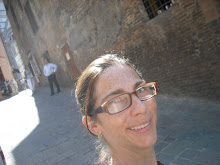Tao and Te, Way and Virtue
I wonder why the translators of this highly recommended and very readable edition of the Tao Te Ching leave "Tao" untranslated, although they make it clear in the introduction that one should have in mind the English words "way" and "path" when one reads it; but, they do not leave "Te" untranslated, although they say that their translation of it as "virtue," could be misleading to Western readers.
Mainly, I'm sorry not to have the relationship of Tao and Te more visible in the text. The following chapter is a striking case in point. Each time the translator uses "virtue," I've substituted "Te."
All things arise from Tao
They are nourished by Te.
They are formed from matter.
They are shaped by environment.
Thus the ten thousand things all respect Tao and honor Te.
Respect of Tao and honor of Te are not demanded,
But they are in the nature of things.
Therefore all things arise from Tao.
By Te they are nourished,
Developed, cared for,
Sheltered, comforted,
Grown, and protected.
Creating without claiming,
Doing without taking credit,
Guiding without interfering
This is Primal Te.
#51
Look at the pattern that emerges! With the Te more obvious, one can see why this is the Tao Te Ching (the Way Virtue Book) and not just the Tao Ching.
Not to take anything away from the Tao--I have far to go before I know the way; but, Te is clearly central to the book, and centrally interesting to me. It seems, in fact, that a central difference between those who maintain an engagement only with the surface of the Tao Te Ching are described as those who do not attempt it in practice, that is, those who neglect Te. If that is right, then an active knowledge of Te is requisite to a deeper engagement with Tao.
All of this sounds a lot like Aristotle to me. Dozens of time I've explained to students that Aristotle's subject in the Nicomachean Ethics is not abstract knowledge, but deliberate action. to act virtuously, for Aristotle, is to act in the right way, at the right time, for the right reasons. All of these qualities of action require careful deliberation regarding the nature of one's situation and one's own nature; but, none of these deliberations are possible without experience, and no conclusion that one could draw from such careful deliberation would be complete unless it were acted upon. So, the development of virtue demands both a development of one's understanding of virtue and the crafting of one's character such that one develops the habit of acting on one's best lights. Virtuous action depends on careful, clear consideration of the nature of the "way things are" and of one's own nature; but knowledge of the way things are (in the world and in oneself) requires action that approximates virtue.
Is this the same as (or similar to) Lao-Tzu's notion that one must learn the Tao to develop Te and practice Te in order to see the Tao more clearly? Sort of looks like it to me.


2 Comments:
Ch-
As a more outright version of this idea, Chaung Tzu offers:
What is, is, what is not, is not
The Tao is made because we walk it
I feel like the idea that you have put forward is that there is a symbiosis between awareness of Tao and cultivation of Te. This is really fascinating.
What trips me up a tad is that there seems to be a profound indifference to Te that follows enlightenment. What I means is that the cultivation of Te allows a clearer vision of Tao, yet Te also seems to self destruct at the right moment of awareness of Tao to allow for the spontaneous, and righteous/benevolent-free actions of the enlightened person. What is, simply is, without any moral overture. Righteousness is described as the sage's stifling or misunderstanding of Tao in several places in both the Chuang Tzu and Tao Te Ching.
This also fits in to the dialog with Confucian hierarchical social morality that the Taoists seem so set against.
Perhaps one becomes enlightened beyond righteousness eventually, and there is a synthesis of Tao and Te instead of a symbiosis?
Perhaps this is a pinnacle of sorts for Te, that it becomes "natural" beyond ethical imperatives and sort of dissolves itself into Tao?
I'm down for you to call all of this non-sense (not in a special Eastern way either, just straight up non-sense)!
Ben
Your sense of Te self destructing makes me even more confident of the Lao-Tzu/Aristotle connection. For Aristotle, the eudaimonic man . . . the one who lives a life of perfect human flourishing (which is still an activity, not a passive final state) no longer deliberates on action. His prior deliberations and the habits he's developed that followed from those deliberations have become an organic part of him. Were he to deliberate, he would act just as he acts; but, deliberation is not longer necessary.
So, in a sense, the flourishing man is not a virtuous man, since virtue requires deliberation. I think this is analogous to the difference between being philosophical (that is, loving wisdom) and being wise. To be wise is not the same as loving wisdom. Wise men are not, in that sense, philosophical.
The difference between virtue (of which justice is a part) and flourishing is also illuminated, I think, in Aristotle's claim that friends have no need for justice. I wonder if there's a Taoist analog to that claim.
Post a Comment
<< Home